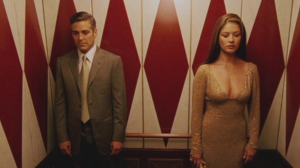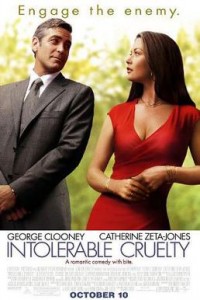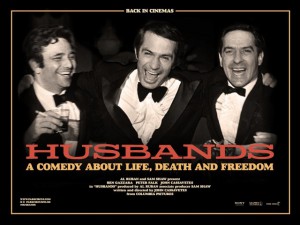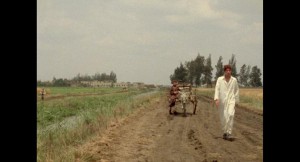From the Chicago Reader (October 1, 2007). — J.R.

If you were delighted by the euphoric cynicism about corruption in L.A. Confidential and Chicago (I wasn’t), you probably should make a beeline for Joel and Ethan Coen’s brittle farce about corruption in divorce proceedings, in which hotshot lawyer George Clooney and professional divorcee Catherine Zeta-Jones are too busy screwing each other in the courts to show much interest in actual sex. Buffing up a script they’d worked on eight years earlier with Robert Ramsey, Matthew Stone, and John Romano, the Coens do an efficient job of stamping their signature grotesquerie on sumptuous Beverly Hills and Las Vegas settings and ladling on gallows humor and malice, sometimes with the verve of early Robert Zemeckis. Geoffrey Rush, Cedric the Entertainer, Billy Bob Thornton, Edward Herrmann, and Richard Jenkins round out the gallery of cartoon fools. PG-13, 100 min. (JR)

Read more
Written for Il Cinema Ritrovato’s 2019 catalogue. — J.R.

HUSBANDS
Subtitled “A Comedy about Life, Death and Freedom,” John Cassavetes’ most politically incorrect and machocentric movie (1970), made after the huge commercial success of his 1968 Faces and exercising both the creative control and the studio support it suddenly made possible, is arguably the most improvised and workshopped of his features. Inspired in part by the death of Cassavetes’ older brother Nick in 1957 at the age of 30, the film recounts what happens to a trio of 40ish east coast suburbanites (Cassavetes, Peter Falk, and Ben Gazzara) when their best friend dies and they decide to play hooky from their lives and families to recover their camaraderie and identities. But even though their collective flight seemingly has something to do with life, death, and freedom, there isn’t a Huck Finn in the bunch; they’re all Tom Sawyers, too desperate in their frantic fun and games to be as comic as they want to see themselves. Their fear of female assertiveness and their periodic brutality, as well as Cassavetes’ determination to follow the actors’ instincts and movements wherever they go without chalk marks are likely what inspired Elaine May to co-opt Cassavetes, Falk, and Husband’s cinematographer Victor J. Read more
These are expanded Chicago Reader capsules written for a 2003 collection edited by Steven Jay Schneider. I contributed 72 of these in all; here are the sixth dozen, in alphabetical order. — J.R.

Too Early, Too Late
This 1981 color documentary by Jean-Marie Straub and Danièle Huillet, one of their few works in 16-millimeter, is almost certainly my favorite landscape film. There are no “characters” in this 105-minute feature about places, yet paradoxically it’s the most densely populated work in their oeuvre to date. The first part shows a series of locations in contemporary France, accompanied by Huillet reading part of a letter Friedrich Engels wrote to Karl Kautsky describing the impoverished state of French peasants, and excerpts from the “Notebooks of Grievances” compiled in 1789 by the village mayors of those same locales in response to plans for further taxation. The especially fine second section, roughly twice as long, does the same thing with a more recent Marxist text by Mahmoud Hussein about Egyptian peasants’ resistance to English occupation prior to the “petit-bourgeois” revolution of Neguib in 1952. Both sections suggest that the peasants revolted too soon and succeeded too late. One of the film’s formal inspirations is Beethoven’s late quartets, and its slow rhythm is central to the experience it yields; what’s remarkable about Straub and Huillet’s beautiful long takes is how their rigorous attention to both sound and image seems to open up an entire universe, whether in front of a large urban factory or out on a country road. Read more




